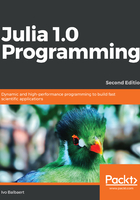
Linux OS
Generic Linux binaries for x86 can be downloaded. This will get you a compressed tar.gz archive that will have a name similar to julia-1.0-linux-x86_64.tar.gz, for example, in your ~/Downloads directory in Ubuntu. Open up a Terminal window and navigate to the Downloads directory using cd Downloads. Move the tar.gz file to a directory of your choice, and then extract the tar.gz file using the tar -zxvf julia-1.0-linux-x86_64.tar.gz command. A directory with the extracted contents will be generated in the same parent directory as the compressed archive with a name similar to julia-n.m.p, where n.m.p is Julia's version number.
This is the directory from which Julia will be run; no further installation is needed. To run it, simply navigate to the julia-n.m.p\bin directory in your Terminal and type: ./julia.
If you want to be at the bleeding edge of development, you can download the nightly builds instead of the stable releases from https://julialang.org/downloads/nightlies.html. The nightly builds are generally less stable, but will contain the most recent features. They are available for Windows, Linux, and OS X.
The path to the Julia executable is contained in the environment variable, JULIA_BINDIR (for example, in our installation procedure, this was C:\Julia\bin on Windows).
If you want code to be run whenever you start a Julia session, put it in /home/.juliarc.jl on Ubuntu, ~/.juliarc.jl on OS X, or C:\Users\username\.juliarc.jl on Windows.